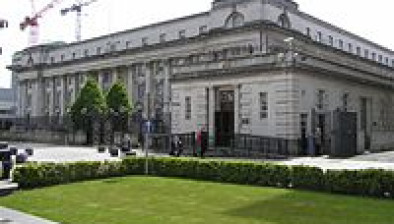High Court: James Lucey & Co granted order charging sum owing to former client from deceased’s estate

The High Court has granted an order pursuant to s.3 of the Legal Practitioners (Ireland) Act 1876 to James Lucey & Company in respect of outstanding counsels’ fees due to a former client.

About this case:
- Citation:[2024] IEHC 667
- Judgment:
- Court:High Court
- Judge:Mr Justice Oisín Quinn
Delivering judgment for the High Court, Mr Justice Oisin Quinn determined that “there is no closed set of categories of circumstances in which an application must fit. A simple unexplained refusal to pay could plausibly come within the circumstances that might trigger a section 3 application once the statutory requirements are met. In all events, the court is still required in the exercise of its discretion to consider all the circumstances that pertain to the situation.”
Background
The plaintiff challenged the will of his late father who died in 2007. The defendant, the sister of the plaintiff, was originally the executrix of the deceased’s estate until her removal in 2019 by the High Court.
The deceased’s estate included a 122 acre farm in Tipperary, which was left to the defendant in the deceased’s last will in 2006. In circumstances where the deceased’s previous 2005 will had bequeathed the farm to the plaintiff, he issued proceedings asserting proprietary estoppel, duress and undue influence.
The plaintiff succeeded on the proprietary estoppel ground before the High Court in 2012 and was found to be entitled to the ownership of the farm, then worth €525,000, but was unsuccessful in his challenge to the last will. Both the plaintiff and defendant were granted orders for their costs as costs in the administration of the estate in 2013.
In 2018, the Court of Appeal dismissed the defendant’s appeal against the High Court finding of estoppel, affirming the High Court’s order save insofar as the plaintiff was required to disclaim a bequest of €150,000 in the last will and the costs order made in his favour was reduced to 75 per cent. The plaintiff was awarded 100 per cent of his costs in the Court of Appeal as costs in the administration of the estate. The defendant was also awarded costs as costs in the administration of the estate.
Following the High Court proceedings, the plaintiff was represented by a different firm of solicitors who then ceased practising, and the file was handed over to James Lucey & Company.
Thereafter in 2019, the High Court made an order upon application of the defendant’s solicitor removing her as executrix and appointing the solicitor as administrator of the estate. Subsequently, proceedings issued in the Circuit Court between the administrator and the defendant concerning another estate property, resulting in further costs being incurred in the administration of the estate and ultimately, rendering it insolvent.
Upon further application by the administrator, the High Court ordered that the executrix’s and administrator’s costs took priority.
The plaintiff discharged an agreed sum to the firm of solicitors who initially represented him in the High Court and Court of Appeal and discharged an initial sum of €30,000 to senior counsel in advance of the High Court hearing. A further sum of €351,853.50 remained outstanding to counsel in respect of the High Court and Court of Appeal hearing.
James Lucey & Company sought orders pursuant to s.3 of the Legal Practitioners (Ireland) Act 1876 charging the outstanding fees on the plaintiff’s farm.
The High Court
The High Court outlined that it was agreed by both sides that the plaintiff’s liability for costs was a matter for the Legal Costs Adjudicator.
Mr Justice Quinn had regard to the jurisdiction of the court under s.3 of the 1876 Act, recognising that it appeared “clear that a dispute about the final amount of the costs is not in itself a bar to relief under the section” but that it would not be appropriate to resolve disputed questions of fact or priority, such as the dispute before the court in relation to whether the plaintiff’s exposure to further costs would be limited to the costs recovered from the estate.
In particular, the judge highlighted the judgment of the Supreme Court in Lett & Co. v Wexford Borough Council & Ors [2016] 1 IR 418 as confirming that s.3 of the 1876 Act confers a right to a charge for taxed costs only.
Mr Justice Quinn considered whether an application under s.3 could succeed without the applicant solicitor demonstrating that he would not be otherwise able to recover his fees and/or whether demonstrating some kind of default on the plaintiff’s part was necessary.
The court referred again to the judgment in Lett, highlighting that what is implicit in s.3 is that an entitlement to a charge arises where fees and outlay have not been paid by a client to the solicitor by whose efforts the costs were procured.
Mr Justice Quinn noted that it was “implicit from the jurisprudence that the entitlement to relief depends on there being costs due that have not been paid”.
The judge continued: “Nonetheless, there is no closed set of categories of circumstances in which an application must fit. A simple unexplained refusal to pay could plausibly come within the circumstances that might trigger a section 3 application once the statutory requirements are met. In all events, the court is still required in the exercise of its discretion to consider all the circumstances that pertain to the situation.”
Emphasising that the court’s jurisdiction was overlaid with equitable principles and so the consideration of countervailing circumstances in respect of the payment of the outstanding fees was necessary.
Noting the plaintiff’s contention that his understanding was that further fees due to counsel would be limited to fees recovered from the estate, the court considered that this “was not a bare or mere assertion” and also had regard to the “relative absence of paperwork submitted on behalf of the firm in support of this application”.
Finding that no demand for payment had been exhibited by the firm and that only the fee-notes of counsel set out what was due, Mr Justice Quinn considered that the court “must approach the matter on the basis that there is a prospect that the plaintiff’s liability to discharge further legal fees may be limited to fees recovered from the estate as part of the order granting the costs of the plaintiff as ‘costs in the administration of the estate’.”
Observing that the core argument before him was that due to the insolvency of the estate no fees would emerge therefrom to the benefit of the plaintiff and his legal team, Mr Justice Quinn determined: “This leaves the property, being the farm, which was recovered for the plaintiff due to the efforts of his legal team as the most realistic source of having those fees discharged.”
The High Court found that the possibility of the dispute as to liability for the fees being determined in favour of the plaintiff by the Legal Costs Adjudicator together with the absence of any apprehension that the plaintiff would put the farm beyond the reach of his former legal advisors were together significant countervailing circumstances which weighed against the refusal of relief as against the farm.
Conclusion
Accordingly, the High Court refused to grant an order charging the farm, but granted an order pursuant to s.3 declaring that James Lucey & Co was entitled to a charge upon any sum — limited to €351,000 — paid to the plaintiff by the administrator of the estate in respect of his High Court and Court of Appeal costs.
Naylor (otherwise Hoare) v. Maher [2024] IEHC 667









